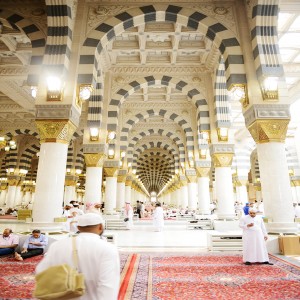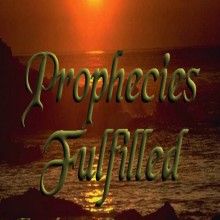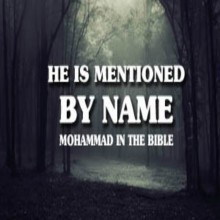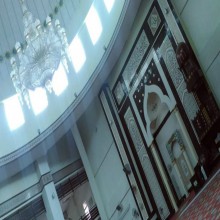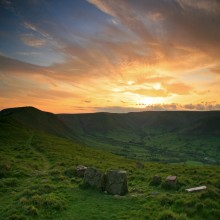Just The Basics
Islam: A peaceful religion of worship and submission to God.
Muslim: A person who believes in and practices Islam. There are 1.6 billion Muslims in the world today from all races and backgrounds.
Allah: Arabic word for God. Allah is the God of Abraham, Moses, Jesus, and Muhammad. He is the Creator of all human beings.
Prophet Muhammad : The Last Prophet sent by God to deliver His message to all of humanity. He was born over 1400 years ago in the city of Mecca.
Quran (or Koran): The sacred book of Islam. The Quran is the Speech of God that was revealed to the Prophet Muhammad and written down during his life.
‘....I became more than ever convinced that it was not the sword that won a place for Islam in those days in the scheme of life. It was the rigid simplicity, the utter self-effacement of the prophet, the scrupulous regard for his pledges, his intense devotion to his friends and followers, his intrepidity, his fearlessness, his absolute trust in God and in his own mission. These, and not the sword, carried everything before them and surmounted every trouble.’Gandhi in Young India (periodical), 1928, Volume X.
‘He was of a certainty a most unique and special man who demonstrated within his own life the virtues of humility, compassion, obedience, and a thirst for justice, and a call for all men to worship the one and only God of all creation…The message of Muhammad was, and remains to this day, a message of peace, mercy, and compassion.’William W. Baker, former college Professor of Ancient History and Biblical Studies, member of Near East Institute of Archaeology and the Oxford Philosophical Society in More in Common Thank You Think, 1988 Defenders Publications. p. 6-7.
Major Events in The Prophet Muhammad’s Life
570 C.E. Prophet Muhammad is born.
610 C.E. He receives the first revelation of the Quran.
612 C.E. Prophet Muhammad begins to preach publicly.
615 C.E. The Muslim community is persecuted by the rich and powerful in Mecca.
622 C.E. Hijrah – Seventy Muslim families migrate to Medina followed by the Prophet Muhammad to Africa.
624 C.E. The Battle of Badr – Muslims win a dramatic victory over Meccan forces.
625 C.E. The Battle of Uhud – Muslim forces suffer losses after an initial victory.
627 C.E. The Battle of the Trench – Muslims hold off and defeat a besieging Meccan army.
628 C.E. A peace treaty is signed between Mecca and Medina.
630 C.E. Mecca violates the peace treaty. The Prophet Muhammad and his army enter Mecca unopposed.
632 C.E. Death of the Prophet Muhammad .
Biographical Facts About Him
- He was born an orphan, as his father died while his mother was carrying him.[1]
- He was raised first by his grandfather, then by his uncle.
- He could neither read nor write.
- He received the first revelation of the Quran and was visited by the angel Gabriel at the age of 40.
- An African Christian king gave protection to early Muslims from persecution.
- He lived to the age of 63, married, raised children, stepchildren, and grandchildren.
- He is buried in the city of Medina in present day Saudi Arabia
His Message
- Muhammad's message to his people was to leave pagan polytheism, immorality and materialism, repent from sins, and worship the one true God, the God of the prophets Abraham, Moses, and Jesus.
- He emphasized equality of human beings, social justice, and women’s rights.
- He was always careful to clarify that he was only a prophet whose job was to deliver what he had received.
- He did not claim to be an angel or have any powers of God.
- He never claimed to work miracles on his own.
- He taught that Jesus was not God or a son of God, but was a human prophet.His Life in a Nutshell
Muhammad , whose name in Arabic means ‘the praised one,’ was born in the town of Mecca which is situated in Saudi Arabia today. He was the son of a young couple from the tribe of Quraish. His father, Abdullah, died two months before his birth, and his mother, Aamina, died when he was six years old. Both his parents came from a humble, but eminent, background.
His grandfather, Abdul-Muttalib, was the virtual head of the Meccan commonwealth and custodian of the Ka’ba, the cube-shaped building in Mecca built by the Prophet Abraham for the worship of God.
Upon the death of his grandfather, Muhammad went to live with his uncle, Abu Talib, who was a generous gentle man, but was not rich.
The young Muhammad had to earn his own livelihood. He first served as a shepherd, then as an assistant to his uncle’s trading caravans, travelling to northern Arabia and Syria. It was on these ‘business trips’ that he learned trading skills. These skills were later noticed by Khajida, a wealthy widow businesswoman. She hired Muhammad to run her commercial enterprise.
They got married when she was forty and Muhammad was twenty-five. The marriage produced six children, two boys who died as infants and four girls. He remained married to his wife for a period of twenty-five years until her death, despite the fact that taking multiple wives was culturally accepted.
For several years he practiced meditation and contemplation at a cave called Hira on Mt. Nur, on the outskirts of Mecca. It was here, at the age of forty, where he received the first revelation:
‘Proclaim in the Name of your Lord and Sustainer
Who has created –Created humanity out of a mere clot. Proclaim – for your Lord Is the Most Gracious One Who has taught (the use of) the Pen,Taught humanity what they did not know!
Quran 96:1-5
The leaders of Mecca were displeased with the new message which rejected their idol-worship and threatened their way of life. Most of the early believers were from the lowest economic class of society who were attracted to the message of equality and justice. The powerful Meccans tortured them. After years of abuse, the Prophet Muhammad sent some Muslims to a just and fair Christian king in Africa.
The year 620 C.E., when he was fifty years old, was marked by sorrow and sadness as both his wife, Khadijah, and his uncle, Abu Talib, passed away in the same year. Without the protection of his uncle, the Prophet Muhammad turned to other cities for support and shelter. Finally, the people of Madina invited the Muslims to their city and treated them as family.
In Madina, the Prophet Muhammad had a city charter written that guaranteed the rights of all residents and made treaties with all neighboring tribes and cities. No one was forced to convert to Islam. Over the coming years, several battles ensued until a truce was struck at Hudaibiya, a place near Mecca. When the truce was violated, the Prophet Muhammad marched to Mecca. Instead of vengeance and plunder, the Prophet Muhammad granted amnesty. Meccans, for their part, accepted Islam.
His Moral Teachings
- “The best of you are they who have the best character.”
- “The most perfect of the believers in faith are the best of them in manners. And the best among them are those who are best to their wives.”
- “He who does not show mercy to others, will not be shown mercy.”
- “I have not been sent as one to curse but as a mercy.”
- “All humanity is from Adam and Adam is from clay. There is no superiority for an Arab over a non-Arab, nor for a black over a white, except through piety.”
- “God does not judge you according to your appearance and your wealth, but He looks at your hearts and looks into your deeds.”
- “The strong is not the one who overcomes people by his strength, but the strong is the one who controls himself while in anger.”
- “Show gentleness! For if gentleness is found in something, it beautifies it, and when it is taken out from anything, it makes it defective.”
- “God has revealed to me, that you must be humble. No one should boast over another, and no one should oppress another.”
- “Do not exceed bounds in praising me as the Christians do in praising Jesus, Son of Mary. I am only the Lord’s servant; so call me the Servant of God and His messenger.”
FACT: The coming of the Prophet Muhammad was foretold in the Bible in numerous verses, for example:
“I (God) will raise them up a Prophet from among their brethren, like unto thee (Moses), and I will put my words in his mouth; and he shall speak unto them all that I shall command him.” (Deuteronomy 18:18)
“And I will pray the Father, and he shall give you another Comforter, that he may abide with you forever.” (John 14:16)
Miracles of The Prophet Muhammad
A number of miracles were performed by the Prophet Muhammad as proof that he was a true prophet of God.
The Quran was his greatest miracle:
- Perfect and unmatched language
- Validated by historical, archaeological, and scientific discoveries
- Makes true prophecies
- Numerical structure
The following are just a few miracles he performed based on eyewitness accounts that have reached us through a chain of unbroken authorities:
- Splitting of the Moon
- Food multiplied with his prayers
- Rain poured by his prayers
- Prophet's night journey to Jerusalem and his ascent to the heavens
references
- In Arabian society of the time, a child was considered an orphan if the father had died and the mother was living.

